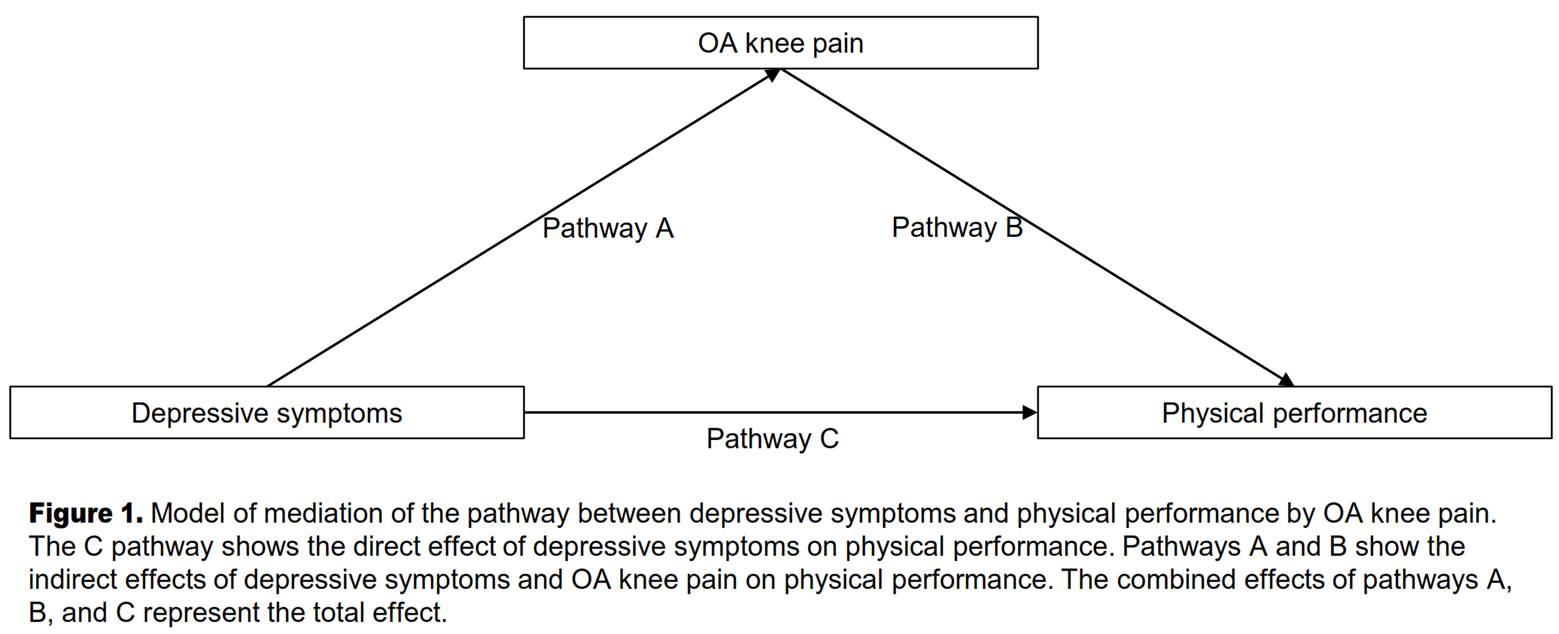Session Information
Session Type: ARHP Concurrent Abstract Session
Session Time: 2:30PM-4:00PM
Background/Purpose: Depression is a significant comorbidity of knee osteoarthritis (OA) that occurs in approximately 20% of OA patients. Depressive symptoms are associated with both subsequent increases in knee pain and decreases in physical performance. It is hypothesized that depression leads to exacerbations in pain severity which, in turn, results in a decreased ability to perform the activities of daily living. The study aim was to determine whether the effect of depressive symptoms on physical performance is mediated by pain severity in knee OA.
Methods: Eligible participants (N=1,487) were enrolled in the Osteoarthritis Initiative, a multi-center natural history study of persons with or at risk for knee OA, who had radiographic disease (Kellgren-Lawrence grade of 2 or 3) at study baseline (time t). Depressive symptoms were measured using the Center for Epidemiological Studies Depression (CES-D) scale at the first annual follow-up visit (time t+1). Knee pain severity was assessed using the Western Ontario and McMaster Universities Arthritis Index pain subscale at the second annual follow-up visit (time t+2). Physical performance was evaluated with timed 20-meter walking speed (meters per second (m/sec)) at the third annual follow-up visit (time t+3). Potential confounders of the exposure-outcome or mediator-outcome relationship were measured at time t or t+1 and included age, sex, race, marital status, health insurance, employment, smoking, alcohol consumption, history of knee injury, comorbidity, analgesic use, baseline knee pain, and baseline physical performance. Marginal structural models that use inverse probability weighting were used to estimate the total, indirect (mediated), and direct (unmediated) effect of depressive symptoms at time t+1 mediated by knee pain severity at time t+2 on physical performance at time t+3 (Figure 1).
Results: Depressive symptoms were significantly associated with slower 20-meter gait speed. For each one-unit increase in CES-D score, a subjects’ gait speed would be expected to decrease by -0.0039 m/sec (95% CI: -0.0065, -0.0013; P Value=0.004). Effect decomposition yielded statistically significant direct and indirect effects of -0.003 (95% CI: -0.0057, -0.0004; P Value=0.024) and -0.0009 (95% CI: -0.0013, -0.0004; P Value=<0.001), respectively, suggesting that approximately 25% (-0.009/-0.0039) of the effect of depressive symptoms on physical performance is mediated by knee pain.
Conclusion: Depressive symptoms in subjects with knee OA are associated with significantly worse physical function, and this adverse effect is mediated, in part, by knee pain. However, the larger direct effect of depressive symptoms on physical performance implies there are multiple mediators of this relationship. Given that depression negatively affects physical function, it may also result in greater structural disease progression in persons with knee OA.
To cite this abstract in AMA style:
Rathbun A, Shardell M, Yau MS, Baumgarten M, Stuart E, Hochberg M. Pain Severity As a Mediator of the Effect of Depressive Symptoms on Physical Performance in Knee Osteoarthritis [abstract]. Arthritis Rheumatol. 2016; 68 (suppl 10). https://acrabstracts.org/abstract/pain-severity-as-a-mediator-of-the-effect-of-depressive-symptoms-on-physical-performance-in-knee-osteoarthritis/. Accessed .« Back to 2016 ACR/ARHP Annual Meeting
ACR Meeting Abstracts - https://acrabstracts.org/abstract/pain-severity-as-a-mediator-of-the-effect-of-depressive-symptoms-on-physical-performance-in-knee-osteoarthritis/

